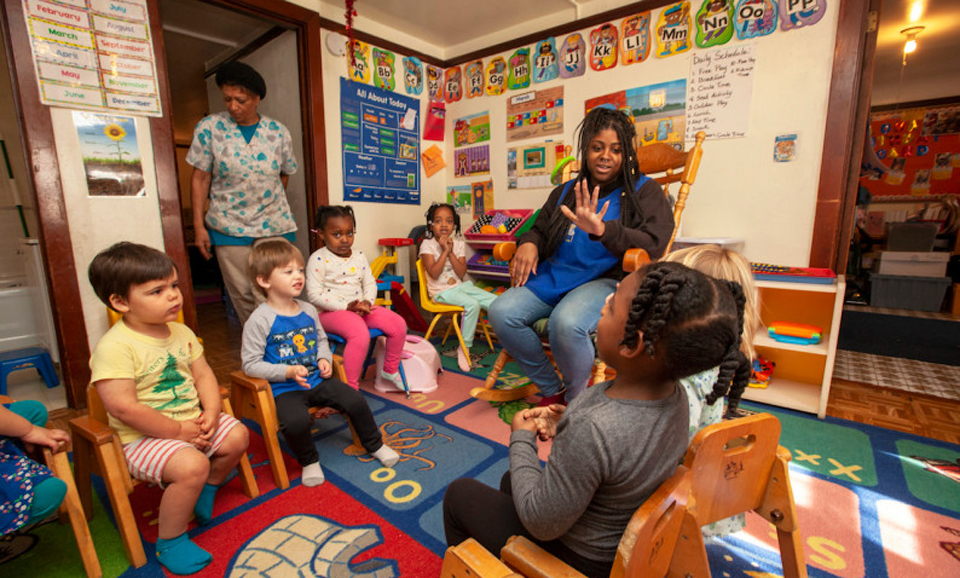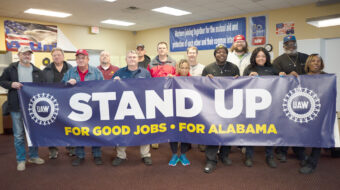
SACRAMENTO—Two of the nation’s largest unions, the Service Employees and the State, County, and Municipal Employees, are gearing up to campaign for recognition among one of the largest groups of workers labor has organized in years—40,000 California child care providers.
The campaign officially kicked off when AFSCME and SEIU turned in 8,000 union election recognition cards at the state capitol in Sacramento on Feb. 5.
But they’re really doing it for the kids they care for, says SEIU member Renaldo Sanders, a 33-year veteran child care provider in Compton, who specializes in caring for kids with disabilities.
“I will never give up on our vision to win child care that works for families, providers, and children!” the South Side Chicago native, who grew up in a low-income neighborhood herself, told SEIU. She’s worked on the organizing drive for 16 years.
But the drive would not have been possible without politics. Organized labor’s huge effort in 2018 produced a pro-worker supermajority in both houses of the state legislature, plus largely pro-worker Gov. Gavin Newsom (D).
Lawmakers passed, and Newsom signed last Oct. 1, legislation permitting the workers to organize and bargain with the agencies that, using state funds, pay the caregivers.
“Oh, happy day! Today we’re at the state capitol officially filing for our union election! We got this! It’s about time every worker, no matter what work they do, has the opportunity to form their union and negotiate for a better life,” one participant in the card delivery by their group, Child Care Providers United, tweeted on Feb. 5. It’s “one of the largest union elections in California in two decades!” CCPU includes two Service Employees locals and an AFSCME local in the joint organizing drive.
The measure lawmakers approved and Newsom signed last year made the Golden State, the nation’s most-populous, the 12th state to let child care providers organize and bargain collectively.
The circumstances in the states are different from private sector organizing drives: While local agencies or individuals employ or assign the child care providers, the state actually pays the freight. The legislation means the state agency recognizes the workers’ collective right to bargain, rather than one by one.
“AFSCME members across the country stand in solidarity with Child Care Providers United as they take another major step forward in winning a union,” AFSCME President Lee Saunders said after the unions delivered their cards to state officials. “California’s child care providers have been undeterred in their decades-long fight for a union because they know unions provide the power in numbers that working people need to negotiate for better wages, training and resources.
“With a voice on the job, providers will also fight for increased access to child care so that all children, no matter their zip code, have a fair opportunity to succeed. We will continue to support CCPU in what is the largest organizing drive in the country as they work to strengthen their communities by improving services for the next generation of Californians.”

SEIU said the key goal of the organizing drive was to enable the child care providers to unionize “to come together to make improvements to the state’s woefully underfunded early childhood education system.”
“Now with the right to negotiate as a union with their employer, the state of California, child care providers will finally be able to effectively fight together for their profession, to negotiate for living wages, benefits, access to affordable training, and professional development,” CCPU said.
“The shameful truth is that despite the responsibility of educating and developing very young children, child care providers make poverty wages and aren’t even covered by basic labor laws such as minimum wage or workers compensation. That’s why it’s so essential that more elected officials stand with us to rewrite the rules so that all of us, no matter where we work, have a chance to stand up and demand better through our union.
“This workforce of mostly women of color, isolated in their own day care centers, will finally be able to take care of themselves—and each other—so they can continue to serve the children and families they love to care for.”

MOST POPULAR TODAY

Zionist organizations leading campaign to stop ceasefire resolutions in D.C. area


High Court essentially bans demonstrations, freedom of assembly in Deep South

Afghanistan’s socialist years: The promising future killed off by U.S. imperialism

Communist Karol Cariola elected president of Chile’s legislature






Comments